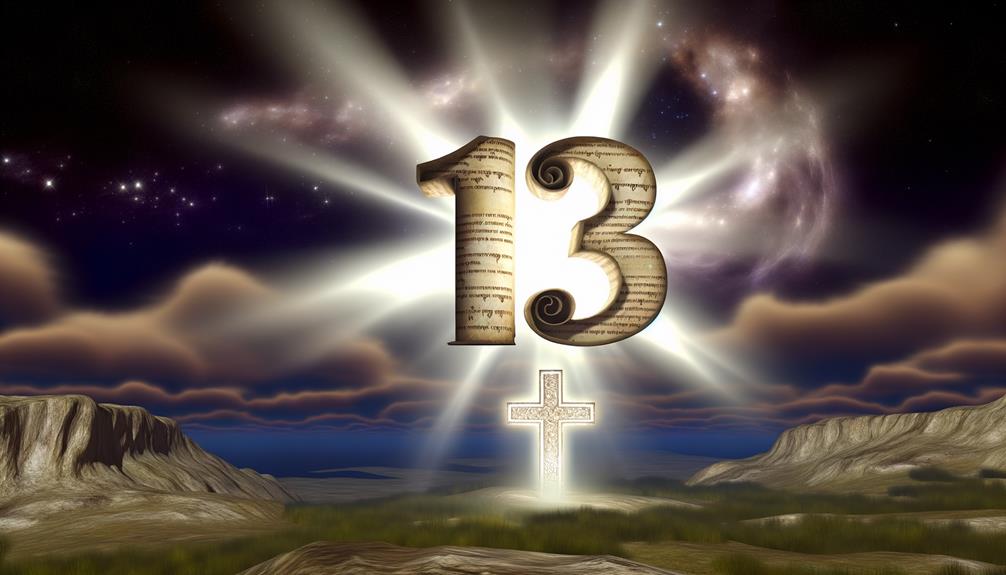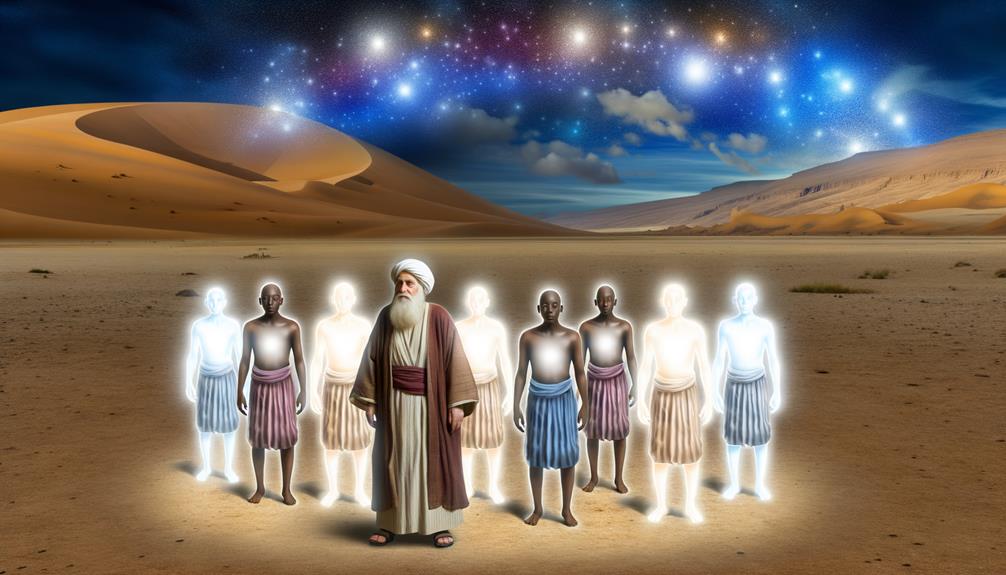Spiritual Meaning of 13 in the Bible: Rebellion and Change
In biblical terms, the number 13 often symbolizes rebellion, lawlessness, and divine judgment. Genesis 14:4 highlights the rebellion of the kings in the thirteenth year.
Additionally, the lineage of Ishmael, emblematic of conflict, marks its thirteenth generation. Biblically, the number is linked to pivotal events of divine retribution, such as Korah’s rebellion against Moses and the rise of the beast in Revelation 13, signifying ultimate defiance.
However, Matthias’s selection as the thirteenth apostle to replace Judas Iscariot nuances this symbolism, representing restoration and divine guidance. Exploring these dimensions reveals deeper theological insights.

Spiritual Meaning of 13 in the Bible: Symbolism of Rebellion, Judgment, and God’s Sovereignty
| Aspect | Biblical Meaning |
|---|---|
| Rebellion & Lawlessness | In the Bible, the number 13 is often associated with rebellion and lawlessness, as seen with the rebellion of kings (Genesis 14:4) and the rise of sin. |
| Symbol of Imperfection | Thirteen is sometimes seen as a number representing imperfection or depravity, in contrast to divine completeness (the number 12). |
| Transition & Judgment | It can symbolize transition, moving from God’s established order to times of judgment or disobedience. |
| End of Old Ways | Spiritually, 13 can mark the end of old systems or behaviors, making way for new beginnings or transformation in a person’s relationship with God. |
| God’s Sovereignty | Despite the negative connotations, God’s sovereignty and ultimate control over judgment and rebellion are emphasized, demonstrating His authority over sin. |
The Number 13 in Scripture

The number 13 in Scripture often carries connotations of rebellion, lawlessness, and judgment, as evidenced by its appearances in various biblical narratives and symbolisms.
For instance, Genesis 14:4 notes that in the thirteenth year, certain kings rebelled against Chedorlaomer, exemplifying a significant act of defiance.
Additionally, in the lineage of Ishmael, the thirteenth generation from Abraham is marked by tumultuous and contentious relations.
Numerological interpretations within biblical exegesis further underscore the notion that 13 symbolizes a departure from divine order.
This recurrence of the number in contexts associated with discord and divine retribution provides a nuanced lens through which to understand its spiritual implications, necessitating a deeper examination of its thematic presence in Scripture.
Rebellion and Lawlessness
The number 13 in biblical contexts often symbolizes rebellion and lawlessness, reflecting instances where individuals or groups defied divine authority.
Numerous scriptural examples illustrate this theme, highlighting the transgressions of figures such as Nimrod and the idolatrous practices of nations.
The repercussions of such defiance are consistently portrayed as severe, underscoring the inherent consequences of straying from divine commandments.
Symbol of Rebellion
In biblical numerology, the number 13 frequently embodies themes of rebellion and lawlessness, as evidenced by its repeated association with acts of defiance against divine authority. This symbolism is rooted in the consistent appearance of the number in contexts that highlight human transgression.
Scholars have identified several key themes associated with the number 13, including:
- Disobedience: Instances where individuals or groups deliberately contravene God’s commands.
- Revolt: Occurrences of organized resistance against divinely appointed leadership.
- Moral Corruption: Situations where moral decay and ethical breaches prevail.
- Judgment: Moments where divine judgment is rendered due to persistent rebellious actions.
Understanding the symbolic role of 13 within these contexts enhances our comprehension of its broader spiritual implications.
Biblical Examples of Lawlessness
Examining specific biblical narratives reveals how the number 13 is intricately woven into episodes of rebellion and lawlessness, providing a deeper understanding of its symbolic resonance.
In Genesis 14:4, the narrative of the rebellion of the kings against Chedorlaomer unfolds in the thirteenth year, marking a significant act of defiance.
Similarly, in Numbers 16, Korah’s rebellion against Moses and Aaron, though not directly tied to the number 13, echoes the thematic elements of revolt and insubordination associated with this number.
In addition, the alignment of the number 13 with the notion of lawlessness is underscored in the New Scriptures, particularly in Revelation 13, where the emergence of the beast symbolizes ultimate rebellion against divine authority.
Consequences of Defiance
Acts of rebellion and lawlessness in the Bible often result in severe consequences, serving as a divine warning against defiance. The number 13 frequently symbolizes rebellion and lawlessness, and its associated narratives underscore the gravity of defying divine commands.
- The Fall of Lucifer: Representing the ultimate rebellion, Lucifer’s defiance led to his expulsion from Heaven (Isaiah 14:12-15).
- The Rebellion of Korah: Korah’s insurrection against Moses resulted in the earth swallowing him and his followers (Numbers 16:1-35).
- The Sin of King Saul: Saul’s disobedience led to his rejection as king (1 Samuel 13:13-14).
- The Apostasy of Israel: Israel’s repeated defiance resulted in exile (2 Kings 17:7-23).
These instances highlight the critical consequences of defiance in biblical contexts.
Matthias: The 13th Apostle

The selection of Matthias as the 13th apostle, following the betrayal and subsequent death of Judas Iscariot, marks a pivotal moment in early Christian history.
This process, characterized by prayer and casting lots, underscores the symbolic restoration of apostolic integrity and continuity.
The inclusion of Matthias consequently invites a deeper examination of the number 13’s spiritual implications within the biblical narrative, challenging traditional associations of the number with misfortune and rebellion.
Matthias’ Selection Process
In the process of selecting Matthias as the 13th Apostle, the early Christian community adhered to a rigorous and spiritually guided method to guarantee the continuation of apostolic leadership. This method is meticulously documented in the Acts of the Apostles, reflecting the community’s commitment to divine will and procedural integrity.
The selection process involved several key steps:
- Identification of Candidates: Only those who had been with Jesus from His baptism to His ascension were considered.
- Community Prayers: The community collectively prayed for divine guidance.
- Casting Lots: This ancient practice was employed to seek God’s choice.
- Apostolic Confirmation: The chosen individual was formally accepted by the remaining apostles.
Replacing Judas Iscariot
Matthias’ appointment as the 13th Apostle, succeeding Judas Iscariot, exemplifies the early Church’s efforts to restore the integrity and completeness of the apostolic circle. This selection, documented in Acts 1:24-26, highlights the foundational principle of maintaining the sacred number of twelve apostles, which symbolically represented the twelve tribes of Israel. By choosing Matthias, the apostles sought divine guidance to uphold their mission’s continuity and the unity of the early Christian community.
| Criteria | Matthias’ Qualifications |
|---|---|
| Faithfulness | Witness to Jesus’ ministry |
| Selection Process | Chosen by casting lots |
| Symbolism | Restoration of the Twelve |
This decision underscores the theological and symbolic significance rooted in the early Church’s leadership and organizational structure.
Symbolic Significance Explained
Becoming the 13th Apostle, Matthias’ appointment carries profound symbolic significance in biblical numerology and the theological framework of early Christianity. His selection served not merely as a replacement for Judas Iscariot but also as a reaffirmation of divine order and completeness in the apostolic circle. The number 13, often viewed with suspicion in various cultures, acquires a redemptive quality through Matthias, symbolizing restoration and continuity.
Key symbolic significances include:
- Restoration of Apostolic Integrity: Ensuring the group of apostles remained complete.
- Divine Selection: Emphasizing God’s sovereignty in choosing leaders.
- Numerical Balance: Reflecting the importance of maintaining spiritual and organizational harmony.
- Redemption and Renewal: Transforming a number often associated with betrayal into one signifying new beginnings.
Thirteen Attributes of God
The Thirteen Attributes of God, as detailed in the biblical tradition, serve as a profound theological foundation for understanding the nature of divine mercy and justice. These attributes, enumerated in Exodus 34:6-7, offer a nuanced portrayal of God’s character, emphasizing compassion, grace, and truth.
| Attribute | Description |
|---|---|
| Compassion | God’s empathy towards humanity |
| Grace | Undeserved favor |
| Patience | Long-suffering |
| Abundant Kindness | Overflowing benevolence |
| Truth | Fidelity to promises |
| Forgiving Iniquity | Pardoning moral failings |
| Forgiving Transgression | Overlooking willful sins |
| Forgiving Sin | Absorbing general wrongdoing |
| Justice | Fairness in judgment |
| Mercy | Withholding deserved punishment |
This enumeration not only underscores God’s multifaceted nature but also offers a template for human conduct, urging believers to emulate these divine qualities.
Jacob and His 12 Sons

Central to the narrative of the Hebrew patriarchs, the story of Jacob and his twelve sons encapsulates themes of legacy, divine covenant, and the complexities of familial relationships within the biblical context. Jacob, later named Israel, fathered twelve sons who became the progenitors of the twelve tribes of Israel.
The numeric significance of thirteen emerges when considering Jacob and his twelve sons collectively, symbolizing the foundation of the Israelite nation. This familial structure underscores several key aspects:
- Legacy: The perpetuation of the Abrahamic covenant through Jacob’s lineage.
- Divine Covenant: God’s promises to Jacob and his descendants.
- Tribal Identity: The formation of the twelve tribes of Israel.
- Family Dynamics: Intricacies of sibling rivalry and reconciliation.
This narrative intricately weaves together the spiritual and temporal dimensions of Israel’s origins.
Symbolism in the Book of Esther
While the narrative of Jacob and his twelve sons lays a foundation for understanding Israelite identity, the Book of Esther introduces a rich tapestry of symbolism that explores themes of providence, identity, and divine intervention within the Jewish diaspora.
The number 13, often associated with rebellion and judgment, gains a redemptive dimension in this narrative. Esther’s story unfolds as she becomes queen during the 13th year of King Ahasuerus’ reign, symbolizing a transformative period.
Her courage and the hidden presence of God demonstrate divine orchestration, countering the malevolent plans of Haman.
The festival of Purim, commemorating the deliverance of the Jews, reinforces the theme of divine providence, illustrating how perceived misfortunes can be reversed into blessings under God’s sovereignty.
The 13th Generation

How does the concept of the 13th generation reflect broader biblical themes of lineage, legacy, and divine purpose? The 13th generation often symbolizes a culmination of divine planning and fulfillment of God’s promises through successive generations. This concept is seen as a critical juncture where significant transformations occur, reflecting the broader biblical narrative of faith and covenant.
- Lineage: The 13th generation underscores the importance of familial and spiritual lineage, emphasizing the transmission of faith.
- Legacy: It highlights the enduring legacy of biblical figures, whose actions resonate through generations.
- Divine Purpose: The 13th generation often marks a fulfillment of divine promises, showcasing God’s sovereign plan.
- Transformation: It signifies pivotal moments of change or renewal within the biblical narrative, aligning with God’s overarching purpose.
This framework illustrates the interconnectedness of lineage, legacy, and divine orchestration in biblical history.
Twelve Tribes Plus One
Examining the concept of the ‘Twelve Tribes Plus One‘ reveals a nuanced understanding of biblical numerology and the theological significance of the tribe of Levi and the inclusion of Joseph’s sons, Ephraim and Manasseh, within the broader framework of Israel’s tribal structure.
The tribe of Levi, designated for priestly duties, was set apart and consequently not counted among the territorial tribes. To maintain the number twelve, Joseph’s inheritance was divided between his two sons, Ephraim and Manasseh (Genesis 48:5-6).
This arrangement underscores the sacred symmetry and completeness often associated with the number twelve in biblical contexts, while simultaneously hinting at a deeper, layered significance when adding the Levites, resulting in thirteen distinct tribal identities within Israel.
Divine Messages in Numbers

In biblical literature, numbers are often imbued with profound symbolic meanings that convey divine messages and theological truths. The number 13, like other numbers, may be interpreted through this symbolic lens. Understanding its spiritual significance requires examining how numbers are used throughout the Bible to communicate deeper meanings. For example, the repetition of numbers can amplify their symbolic weight, prompting deeper reflection on their spiritual implications. The angel number 1313 meaning may point to themes of renewal, transformation, and a call to trust in divine guidance during times of change. By exploring such numbers in their biblical and spiritual contexts, one gains insight into how they serve as conduits for divine wisdom and reassurance.
- Unity and Disharmony: Thirteen often juxtaposes unity, as seen in the 12 tribes of Israel plus God’s presence, against potential rebellion or disunity.
- Covenant and Betrayal: It can symbolize the frailty of human covenants, as illustrated by Judas Iscariot, the 13th disciple, who betrayed Jesus.
- Judgment and Redemption: Thirteen sometimes signifies divine judgment, but also the opportunity for forgiveness and redemption.
- Completeness and Change: The number marks the end of one era and the beginning of another, indicating spiritual transformation.
Conclusion
In sum, the number 13 in biblical scripture serves as a multifaceted symbol, embodying both rebellion and divine completion.
From Matthias, the 13th apostle, to the 13 attributes of God, and the 13th generation, the number weaves through the Bible like a thread through a tapestry, each instance enriching its theological significance.
The number 13’s recurring presence underscores the intricate and profound nature of biblical numerology, offering layers of meaning and insight for scholarly exploration.






